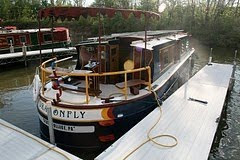 |
| Engineer on deck! |
Spending
some time on the river has given us a good appreciation of how the boating
lifestyle, which one might consider to he pretty unsustainable--especially in
terms of fossil fuel consumption--can be made more sustainable.
Certain aspects of “Looping” are already more sustainable than staying put. By following the seasons, Loopers require less heating and air conditioning than those who stay at home, and they can also have access to fresh local produce that doesn’t have to be transported from great distances. Also, people who live on boats generally occupy a smaller space than those who live in suburban MacMansions.
Certain aspects of “Looping” are already more sustainable than staying put. By following the seasons, Loopers require less heating and air conditioning than those who stay at home, and they can also have access to fresh local produce that doesn’t have to be transported from great distances. Also, people who live on boats generally occupy a smaller space than those who live in suburban MacMansions.
Dragonfly
has been quite an attraction to the assembled Loopers. Many have heard about her by word of mouth or
by various blog posts, and a constant parade of visitors has been coming by
since we docked. A few of the visitors
have experimented with solar power on their own boats, and one massive catamaran a
few slips down has 8 solar panels, the same as Dragonfly, to power
the ship's utilities. This catamaran, Next Endeavor, is probably the second most sustainable boat in the marina.
It’s
important to pause here to comment that when thinking about sustainability, we
can actually be sure if an activity, a way of life, or a community is
sustainable. The Bruntland Commission definition of sustainability says that "sustainability is meeting the
needs of one generation without preventing subsequent generations from meeting
their needs." All well and good, but what
does that mean? What will subsequent
generations need, and what technologies will they have to address these needs?
Most people
give up at this point. We have to reduce
our energy footprint by how much? We
have to give up (insert favorite guilty
pleasure)? Where does it say that in
order for future generations to meet their needs, our needs can’t be met? Hey, I’ve got needs, too!
Relax. Our goal should be to seek increased
sustainability, rather than to insist on absolute sustainability, which can be
a very tall order, and maybe not achievable.
Sustainability can be increased by doing lots of little things that we
are getting used to, by thinking out of the box, as well as by boldly trying
new technologies. You don’t even have to
go the extent of Cynthia and Bill of outfitting a boat to run on solar
power. Just consider the environmental
footprint of an iPod vs. a 1970’s era stereo sound system, or just their
relative power consumption. Oh, that’s sustainability too? Sign me up.
 |
| We spotted this 5 x 3 tow close to Joe Wheeler State Park, where the Looper Rendezvous is taking place |
 |
| Dragonfly just has herbs in its roof garden, but in the Netherlands, people are experimenting with barges that have rooftop vegetable gardens. |
Could the floating city be more sustainable? Sure. I noticed that the conceptual design for River City puts a chip-and-putt course on the topmost deck. With something like 10,000 golf courses along the city’s planned route, this seems unnecessary. Wouldn’t a community garden… and a bank of solar panels … be better?





Go Dad! Hope everyone had a wonderful time this weekend, I look forward to more stories from my parents from their time aboard the Dragonfly.
ReplyDelete